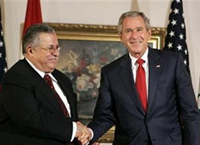Bush, Talabani embrace progress "benchmarks" in Iraq
President George W. Bush assured Iraqi President Jalal Talabani that he is "fully committed" to aiding the Iraqi government and dispatched a top aide to Baghdad to help leaders there make good on their promises.

Talabani, whose visit to the United States has included medical treatment at the Mayo Clinic in Rochester, Minnesota, looked hearty as he sat in the Oval Office and defended his country's progress.
"I told the president that I'm fully committed to helping the Iraqi government achieve important objectives," Bush said.
"We call them benchmarks - political law necessary to show the Iraqi citizens that there is a unified government willing to work on the interest of all people," Bush said.
Bush signed a war spending bill last week that threatens to withhold U.S. aid dollars for Iraq if Baghdad fails to make progress on political and security reforms. The legislation does let the president waive that restriction. To strike a deal with Congress, the White House allowed benchmarks to be included after initially insisting on a clean spending bill.
As daily violence continues to shake Iraq, the two presidents acknowledged Iraq's security troubles. Yet they spoke optimistically about Iraq's ability to make progress on key fronts.
Those include passing legislation to share oil revenue among all Iraqis, holding local elections, overhauling de-Baathification laws and fairly amending the country's constitution.
With patience in the United States eroding, Bush plans to send an emissary to help.
Meghan O'Sullivan, who recently announced she is resigning as deputy national security adviser, will work with U.S. Ambassador Ryan Crocker in helping Iraq's leaders in Baghdad.
She had been the day-to-day coordinator for Iraq at the National Security Council, where she remains through the transition to Bush's newly announced war czar, Lt. Gen. Douglas Lute.
Talabani said Iraq remains committed to gradually taking control of its own country - allowing U.S. troops to leave - after Iraqi forces are fully trained.
There was no mention of when that would happen. The two leaders took no questions.
Talabani made clear his thanks to the American people.
"I don't deny difficulties, I don't deny shortcomings," Talabani said of his country. "I don't deny that still we are suffering from some problems. But we are determined to (meet) benchmarks, and we are determined to move forward and to achieve."
Talabani last visited the White House in September 2005.
At the time, he said he hoped "by the end of 2006 our security forces are up to the level of taking responsibility from many American troops."
A top U.S. commander said Thursday that the U.S. military is working more aggressively to forge cease-fires with Iraqi militants. Yet Lt. Gen. Raymond Odierno also warned he may not be able to fully assess the situation in Iraq by September, as lawmakers demand.
Subscribe to Pravda.Ru Telegram channel, Facebook, RSS!


